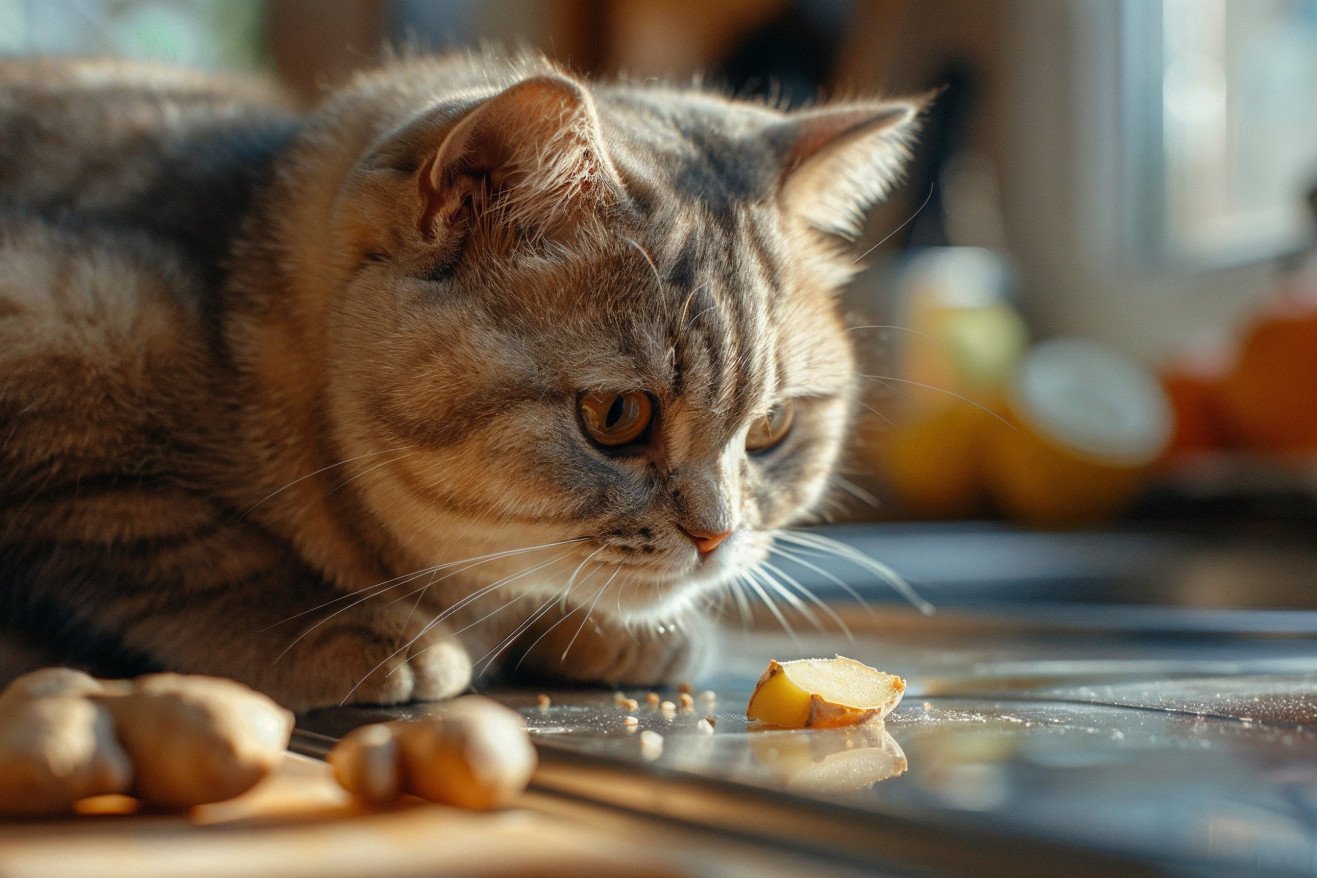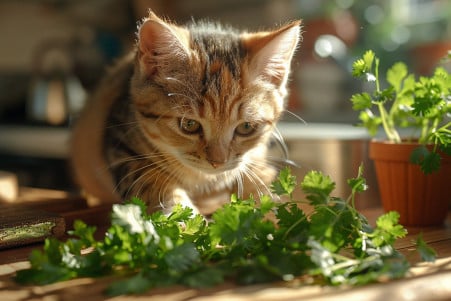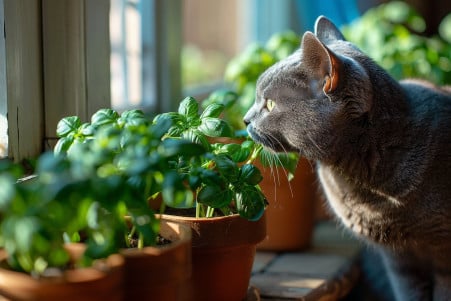Can You Give Cats Ginger? Benefits and Risks of Ginger for Cats
27 February 2024 • Updated 26 February 2024

Ginger is a popular spice known for its bold, zesty taste, but can cats enjoy it too? While ginger is not toxic to cats, they are obligate carnivores, which means their digestive systems are designed to process animal-based foods. Because of this, ginger should be fed to cats in moderation and with caution. Always talk to your vet before giving your cat ginger, especially if your cat has any health problems.
To help you better understand the safety and potential uses of ginger for cats, we’ve referenced a range of sources in the veterinary and animal nutrition fields to bring you the most up-to-date information. We’ve looked at cats’ nutritional needs, how their digestive systems work, and how the active ingredients in ginger may affect them.
Our hope is that this article will give you the information you need to decide if ginger is right for your cat.
Can you give cats ginger?
Cat Digestive Physiology and the Impact of Ginger
Cats have a digestive system that is well-suited to a diet of meat, according to the Merck Veterinary Manual. This system includes 30 teeth that are specialized for tearing flesh, a stomach with a low pH that helps break down food and kill bacteria, and a small and large intestine that are adapted to absorb protein and produce vitamins.
Cats also lack some of the enzymes that herbivores and omnivores have that help break down plant material, so the addition of a plant-based food like ginger must be done with care.
The liver and pancreas help the cat’s body metabolize food by producing bile and digestive enzymes, according to Catit Magazine, but there are many things that can disrupt this process, including digestive disorders. Conditions like colitis, constipation, and inflammatory bowel disease (IBD) can change the way a cat’s body metabolizes new substances, including potentially the active ingredients in ginger.
Because of the way their digestive system is set up, cats may absorb and metabolize the active ingredients in ginger differently than other animals, according to an overview of the cat digestive system by Washington State University. Therefore, it’s important to look at the nutritional makeup of ginger and how it interacts with the cat’s body to determine if it’s safe and effective for cats.
Understanding Ginger’s Impact: How Cats May Metabolize Its Compounds
Ginger, which is known for its spicy flavor, is rich in bioactive compounds such as gingerol, shogaol, and zingerone. These compounds have been shown to have antioxidant, anti-inflammatory, and anti-nausea effects in mammals. According to the NCBI Bookshelf, the gingerols, especially [6]-gingerol, play a key role in these effects and are metabolized in the body through conjugation and oxidation. Yet, the metabolism of ginger and its components in cats has not been well-studied.
The metabolic pathways of cats may metabolize ginger differently than other mammals because of their unique physiology, which includes a need for a high-protein diet and a limited ability to synthesize certain amino acids, according to the Journal of Animal Science and Biotechnology.
Therefore, the potential health effects of ginger’s compounds in cats, which may be similar to those in humans, will depend on whether the compounds can be absorbed and used by the cat’s metabolism.
While the therapeutic effects of ginger seem promising, it’s important to be cautious. High doses can cause gastrointestinal upset, and interactions with drugs, including anticoagulants, have been reported, according to StatPearls. As a result, the safe use of ginger in a cat’s diet will depend on a careful balance of the potential benefits to the cat’s health and the potential risks based on the cat’s specific dietary requirements.
Keeping Your Cat Healthy: How Diet Affects the Immune System
The immune system of the cat, which is a complex system of biological structures and processes, is impacted by the cat’s diet, a phenomenon known as immunonutrition.
Nutritional intake can either help or hurt the immune system. As PetMD explains, proper nutrition is closely tied to the effectiveness of the immune system.
Immunomodulation can range from the provision of essential nutrients to the modification of the immune response to make it more targeted through diet. For example, amino acids like arginine, which is found in certain foods, have been shown to improve T-cell function, which is important for fighting off infections and cancer.
As a paper published in PMC explains, the immune system of the cat is similar to and different from the immune systems of other mammals.
However, it’s not clear if the immune system benefits of ginger in humans can be extended to cats.
While ginger is a source of antioxidants, which are known to help reduce free radical damage, it’s important to remember that new additions to a cat’s diet should be approached with caution, as MDPI notes in its discussion of diet and the immune system in cats.
This information will help veterinarians have more nuanced conversations about whether or not it makes sense to add ginger to a cat’s diet.
What Do Vets Say About Giving Ginger to Cats?
Veterinary professionals, like Dr. Maja Platisa, agree that ginger can be given to cats in moderation but stress the importance of working with a vet. Catster warns that ginger should be given with caution, especially to cats with certain health conditions or those taking certain medications.
VCA Hospitals agrees that ginger is safe and can be used for its anti-nausea and anti-inflammatory properties but cautions against using it in animals with bleeding disorders, gallbladder disease, or in pregnant or lactating animals due to a lack of safety information.
Veterinary professionals also offer advice on the different forms ginger can come in. Fresh ginger root, powdered, or as a supplement are all options, but Catster warns against ginger-flavored products and products that contain spices or sweeteners that could be harmful. When adding ginger to a cat’s diet, it’s important to work with a vet to determine the best form and dose and to check for any potential drug interactions, according to VCA Hospitals.
When adding ginger to a cat’s diet, it should be done gradually and in small amounts as directed by a vet, and the cat should be closely monitored for any adverse reactions. If a cat doesn’t tolerate ginger, it should be stopped and further veterinary advice should be sought. With these things in mind, pet parents can ensure that giving ginger to their cats is in line with their pets’ overall health.
How to Add Ginger to Your Cat’s Diet: A Step-by-Step Guide
If you’re thinking about giving ginger to your cat, it’s important to remember that cats should be introduced to new foods slowly.
As a result, you should start with a very small amount of ginger and see how your cat reacts.
The most common forms of ginger that you can give to your cat include fresh ginger root, ginger powder, and ginger supplements, but Catster warns against using ginger-flavored products that may contain toxic ingredients.
It’s also important to note that you should always consult with a vet before giving your cat ginger because the right dosage for your cat will depend on factors like your cat’s age, weight, and overall health.
While VCA Animal Hospitals notes that side effects like gastrointestinal upset and allergic reactions like hives and redness are rare, they can still happen. If you notice any of these signs, you should stop giving your cat ginger and get in touch with your vet right away.
Always talk to your vet before adding ginger to your cat’s diet to make sure it’s the right choice for your cat based on their individual needs and medical history. Your vet can also tell you how much ginger to give your cat.
This will help ensure that you’re giving your cat the right amount of ginger to support their health. Going forward, being a good pet parent means making informed and careful decisions about your pet’s diet, and that includes getting input from your vet.
Final Thoughts on Adding Ginger to Your Cat’s Diet
Understanding the ins and outs of feline nutrition is important, and ginger is one of the more complex topics. As this article has shown, while ginger isn’t toxic to cats, it should be introduced to their diet with caution. A cat’s digestive system, which is designed to process animal products, may not be as efficient at processing ginger and other plant-based foods as a human’s.
It’s important to work with a vet to make sure that the potential benefits of ginger, including its anti-inflammatory and anti-nausea effects, don’t pose a risk to your cat. This is a fine line that pet owners walk as they try to add healthy things to their cat’s diet while avoiding potential problems.
In short, it’s important to make sure that you’re making well-informed decisions with the help of a professional when you’re thinking about adding ginger or any other new food to your cat’s diet. This will help you make sure that you’re adding healthy things to your cat’s diet while keeping them safe.


